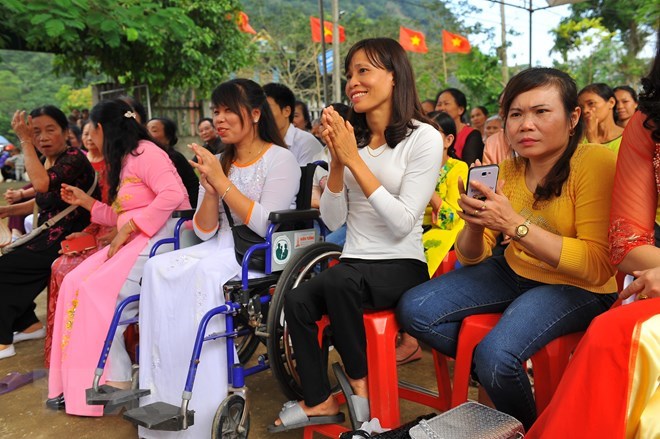
A gathering of people with disabilities in Ninh Binh. Illustrative image (Source: VNA)
The survey is the first of its kind carried out on such a large scale using international tools, including one specially designed by the United Nations Children’s Fund (UNICEF) and the Washington Group on Disability Statistics to examine child functioning. The General Statistics Office, with technical support from UNICEF, ran the survey for two years in 2016 and 2017.
Accordingly, 13 percent of the Vietnamese population, or close to 12 million people, lived in households with disabled members. The rate was forecast to rise in the context of an aging population.
Despite the fact that people with disabilities are subject to favourable health insurance policies, only 2.3 percent of them have access to rehabilitation services when sick or injured.
School attendance rates for children with disabilities, particularly at higher levels of education, were also lower than that of able-bodied children. At the secondary level, below one third of children with disabilities went to school at the right age, compared to the proportion of two-thirds among able-bodied kids. Only two percent of primary and secondary schools in the country had been designed to accommodate the needs of pupils with disabilities, while only one seventh of all total schools have a teacher trained in teaching disabled students.
Lesley Miller, acting chief representative of UNICEF in Vietnam, said the survey is important and timely as Vietnam has begun its implementation of the agenda for sustainable development goals (SDGs), which focuses on the principle of leaving no one behind.
UNICEF expects that the survey will help Vietnam meet the SDGs’ requirement on disability statistics and come up with suitable policies on social service and welfare for the disabled group, she noted.
Australian Ambassador to Vietnam Craig Chittick said the survey brings about information that could help calculate progress in ensuring the rights and interests of people with disabilities and their access to educational and health services. /.
VNA
 ASEAN, China strengthen joint efforts to combat cross-border cybercrime
ASEAN, China strengthen joint efforts to combat cross-border cybercrime



